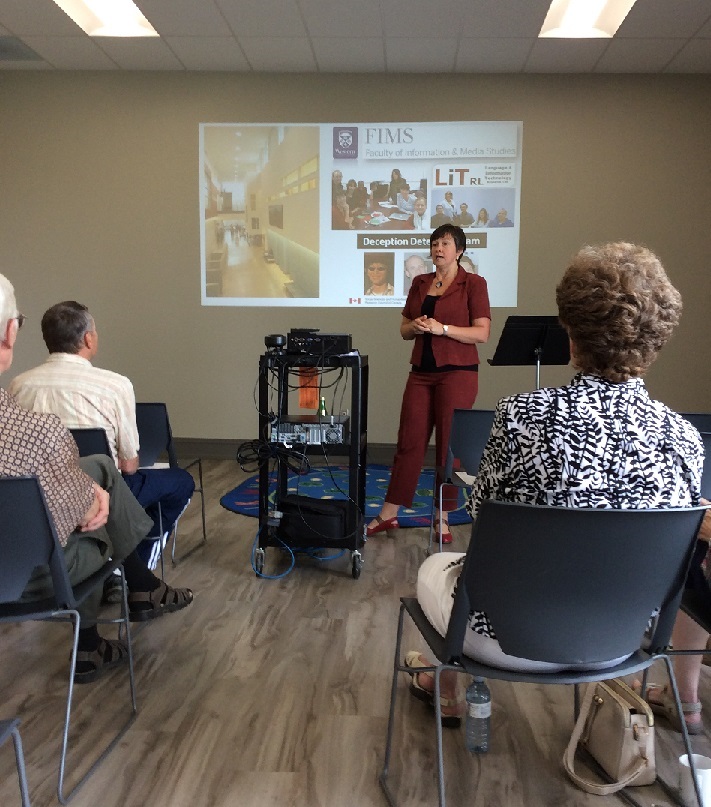I recently gave a talk about deception at the “55 Up Club” in Lucan, in the vicinity of London, Ontario.

Thank you to the Club for inviting me and to the Middlesex County Lucan Library Branch organizers, and specially, Anita Looby for the lovely reception and your thank-you card. The experience was certainly memorable.
Just before my talk, I was chatting with one of the members of the Club over coffee and told her that I was there to learn from them. She didn’t believe me and said that the idea was for me to lecture and for them to learn from me. I hope the learning was mutual. I lectured about varieties of lies such as serious and everyday, or face-to-face and screen-based, and what the clues to recognizing them might be.
 What started off my learning process is a direct question from the audience. At some point, a lady in the audience asked me about “elderly lies”: “Why don’t you tell us more about what’s relevant to the senior citizens’ lies?” Frankly, I never thought of lying as being age-discriminant. There is not much research on that outside of clinical and health care research, at that I’m aware of at this point. What are these “elderly lies”? What makes them distinct, if anything? Perhaps, the context? Perhaps, the vulnerability of those who succumb to mental illnesses in later stages of their lives? I could certainly see that there are some circumstances in which either elders are lying so distinctly, that it becomes a phenomenon of its own, such as often the case with dementia lying or scams directed specifically at elderly.
What started off my learning process is a direct question from the audience. At some point, a lady in the audience asked me about “elderly lies”: “Why don’t you tell us more about what’s relevant to the senior citizens’ lies?” Frankly, I never thought of lying as being age-discriminant. There is not much research on that outside of clinical and health care research, at that I’m aware of at this point. What are these “elderly lies”? What makes them distinct, if anything? Perhaps, the context? Perhaps, the vulnerability of those who succumb to mental illnesses in later stages of their lives? I could certainly see that there are some circumstances in which either elders are lying so distinctly, that it becomes a phenomenon of its own, such as often the case with dementia lying or scams directed specifically at elderly.
During the talk in response to the question I thought of a recent episode of This American Life “In Defense of Ignorance” in which “ Lulu Wang tells the story of an elaborate attempt to keep someone ignorant — her grandmother — and how her family pulled it off”. The elderly grandmother (who lived in China) was not told of her terminal illness. One important fact was concealed from her: she had cancer and her doctor predicted she only had 6 months to live. This morally debatable act of withholding the diagnosis (at least in the North American context of the 21st century) is apparently customary in China, and some other parts of the world (Russia, for instance). A former nurse in the audience told me it was customary in Canada in mid-1950ies as well. The Chinese grandmother lived another 3 years after the diagnosis. Ok, that’s a example of inter-culturally fascinating “elderly context” but would the behavior of the relatives be any different, if it were a 25-year-old cancer patient? From the works of Susan Blum we know that in China it is important to consider consequences of such information regardless of age, gender and so forth.
The more I think back to my experience with the “55 Up Club”, the more I’m grateful to the seniors’ group at Lucan for asking such a simple yet fundamental question. It started off my learning process. What is an elderly lie, anyway? Is there such a phenomenon? Is lying age-dependent?


